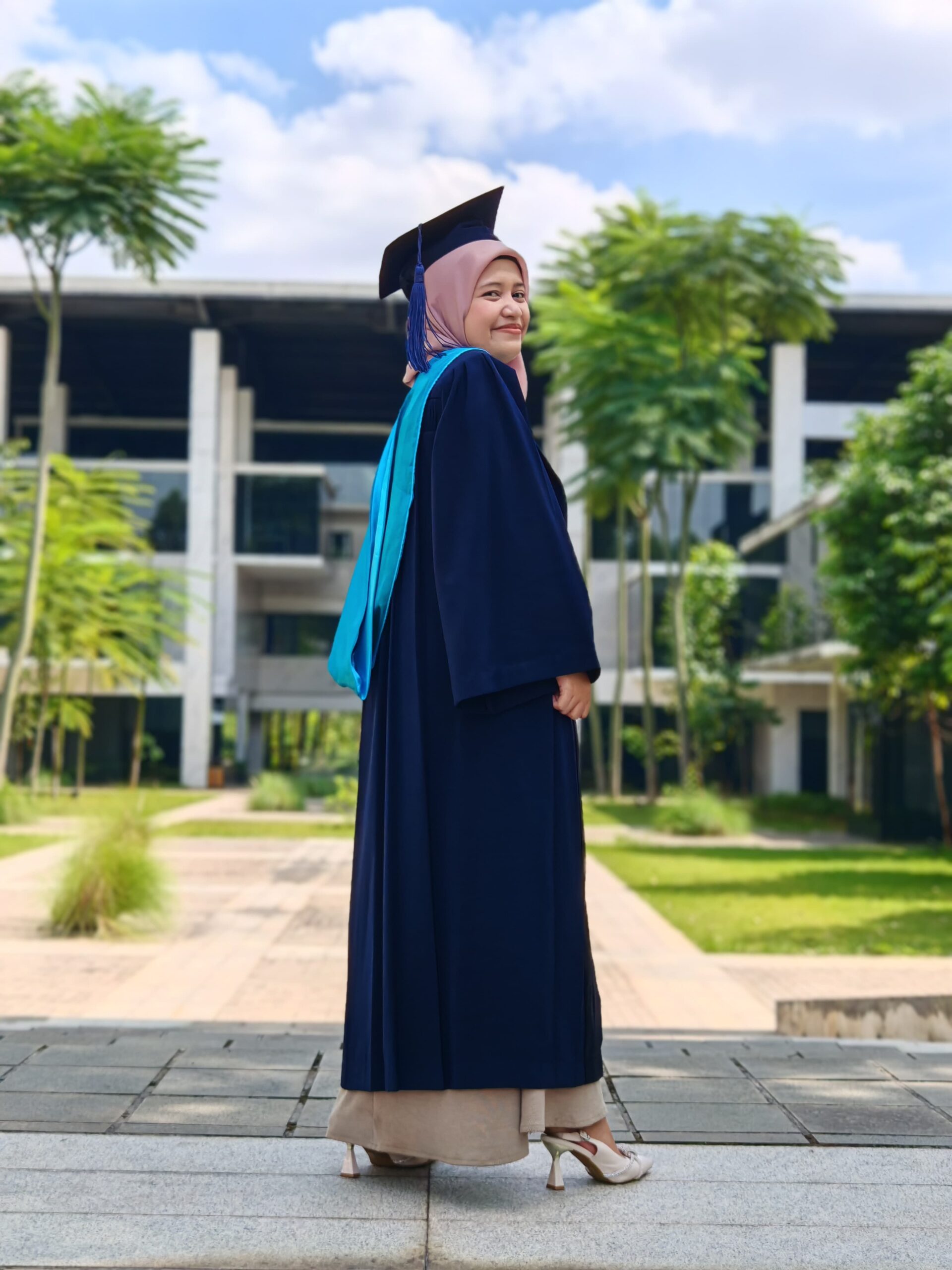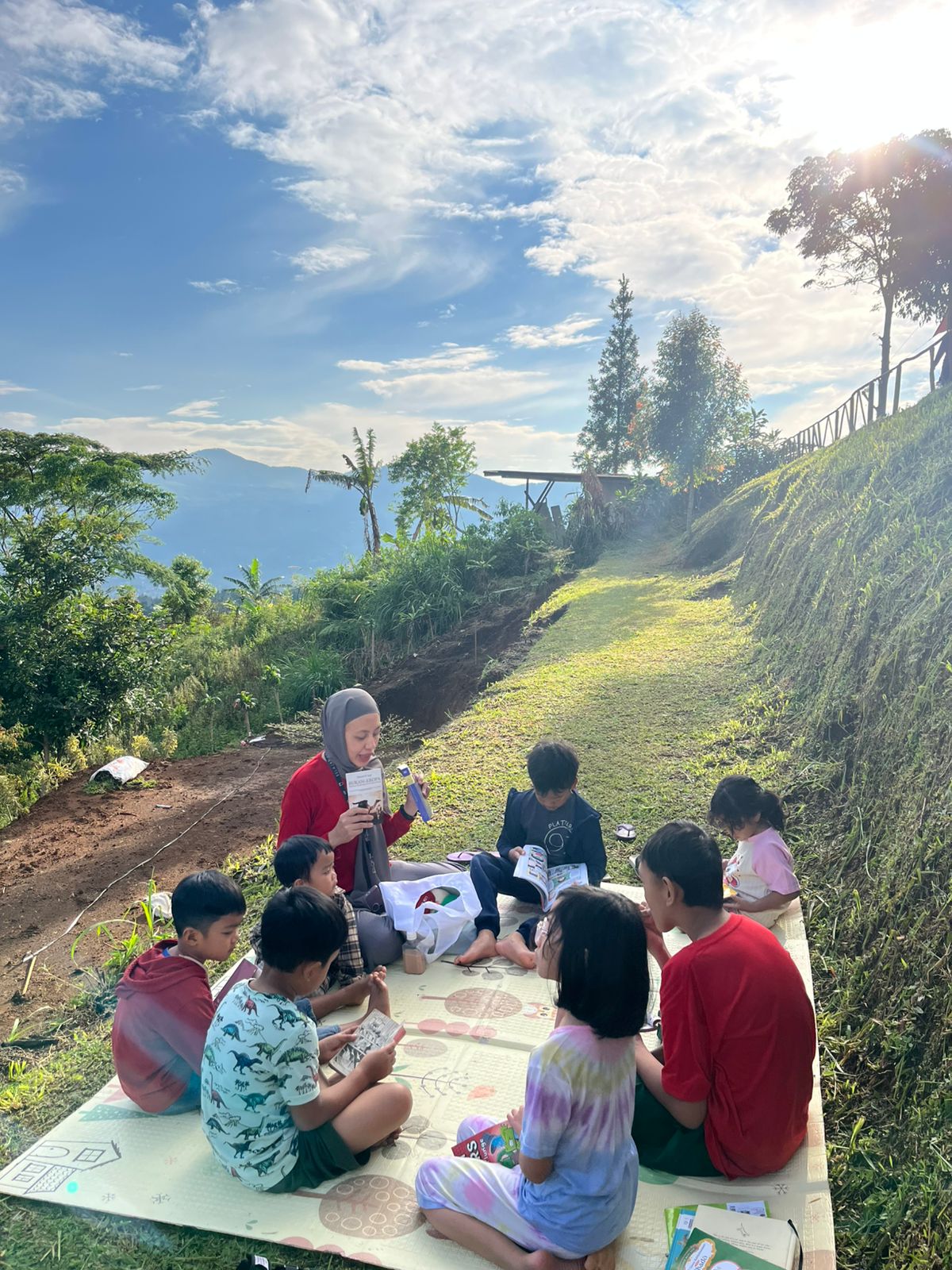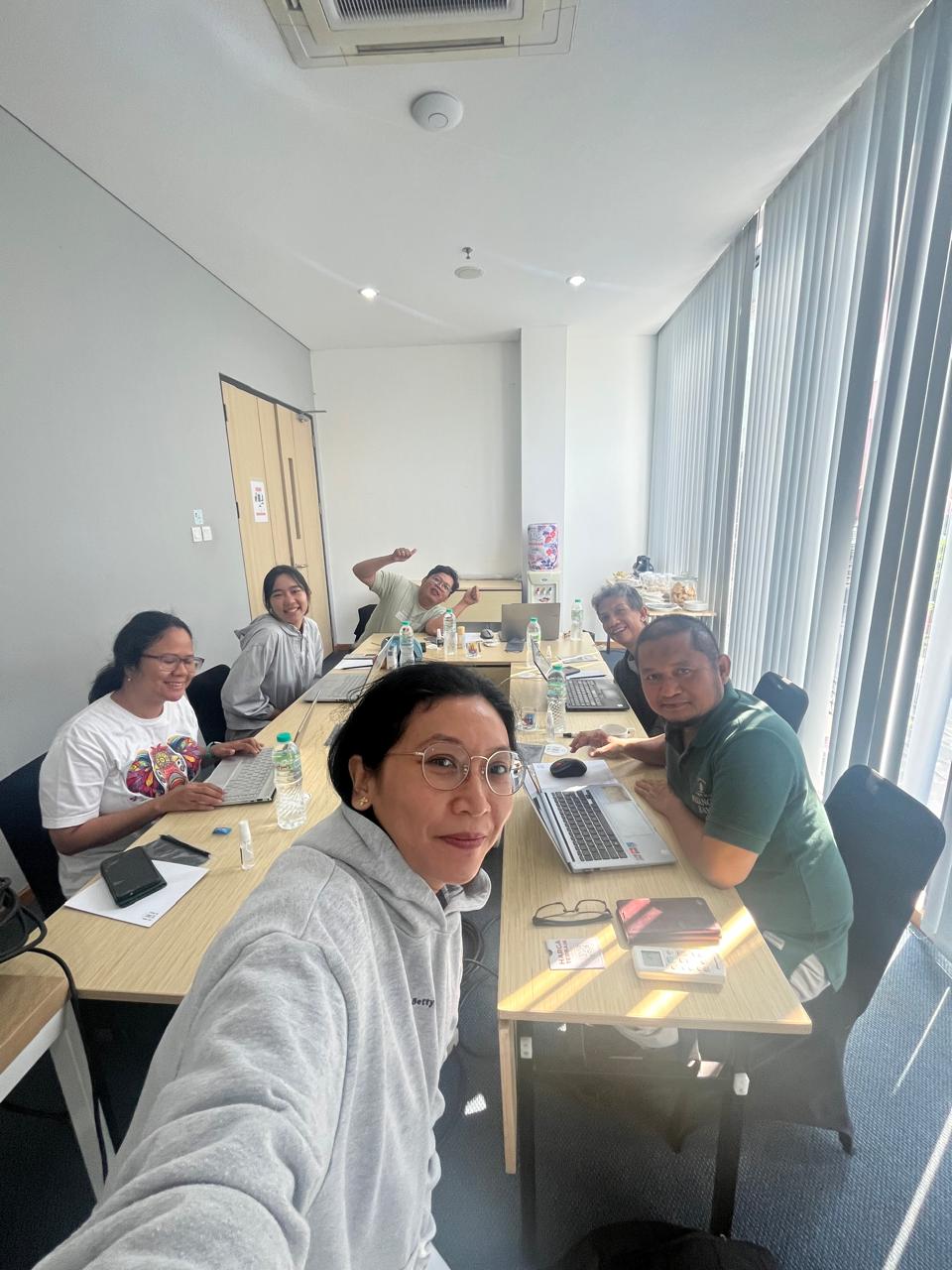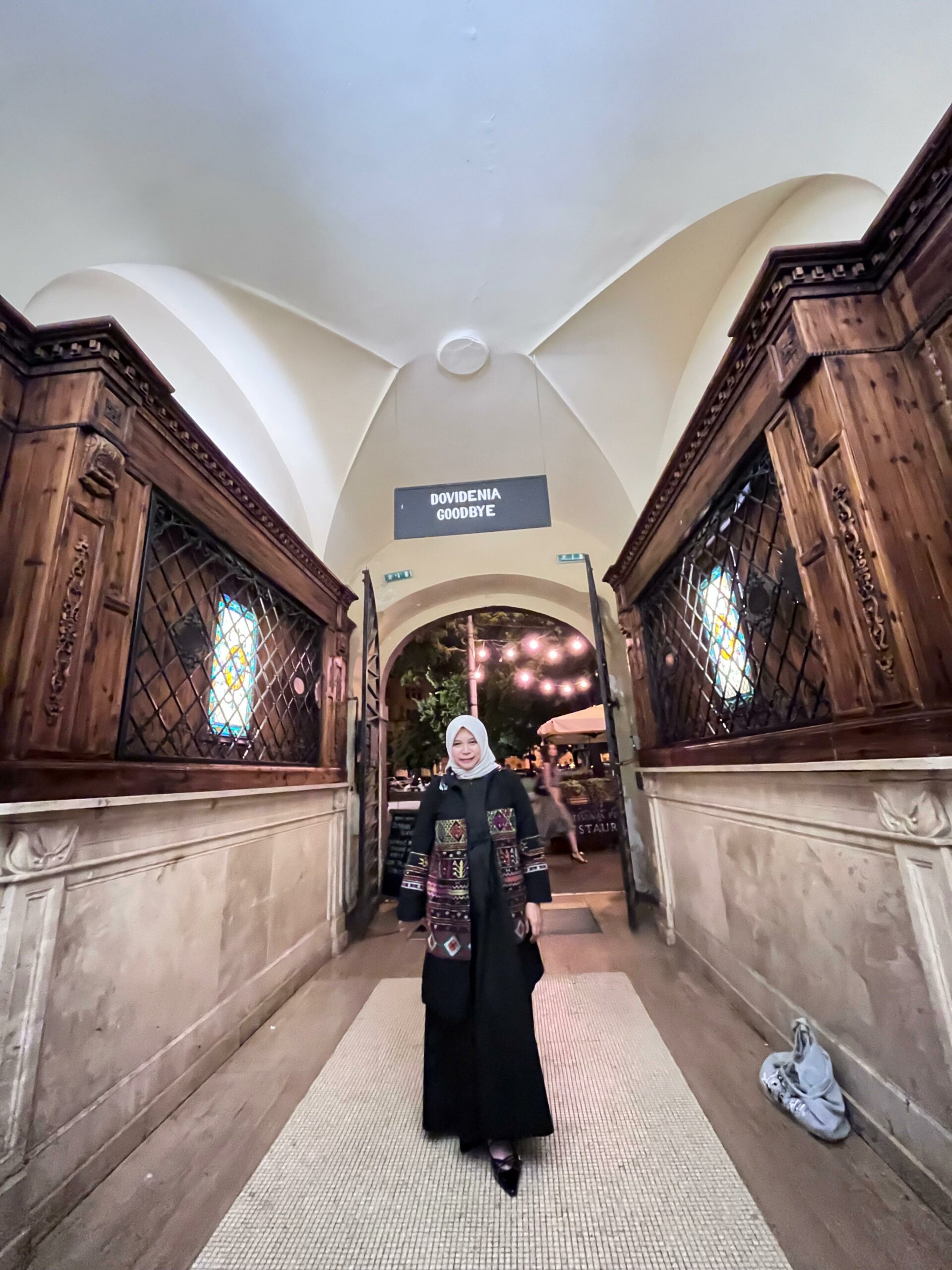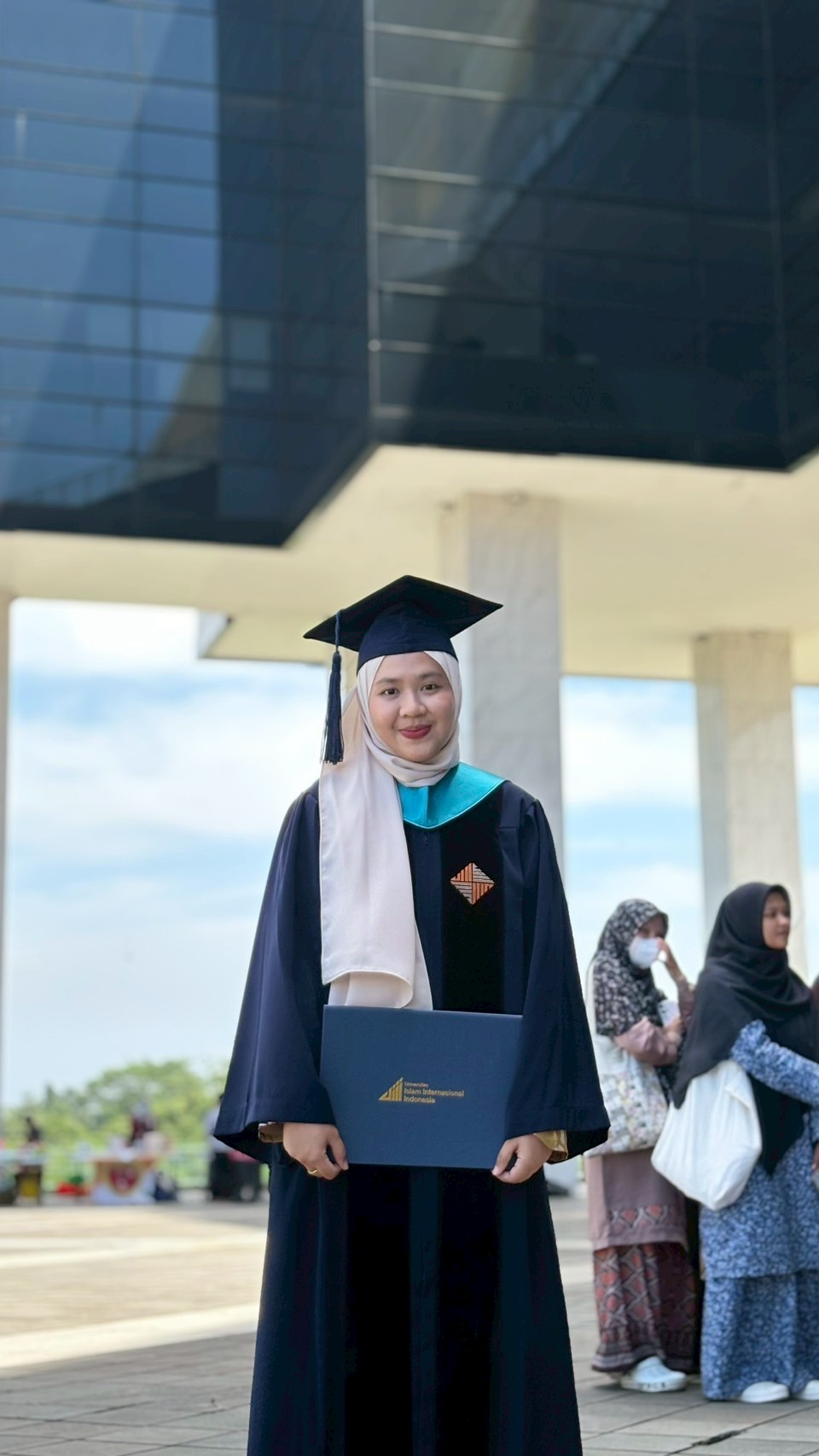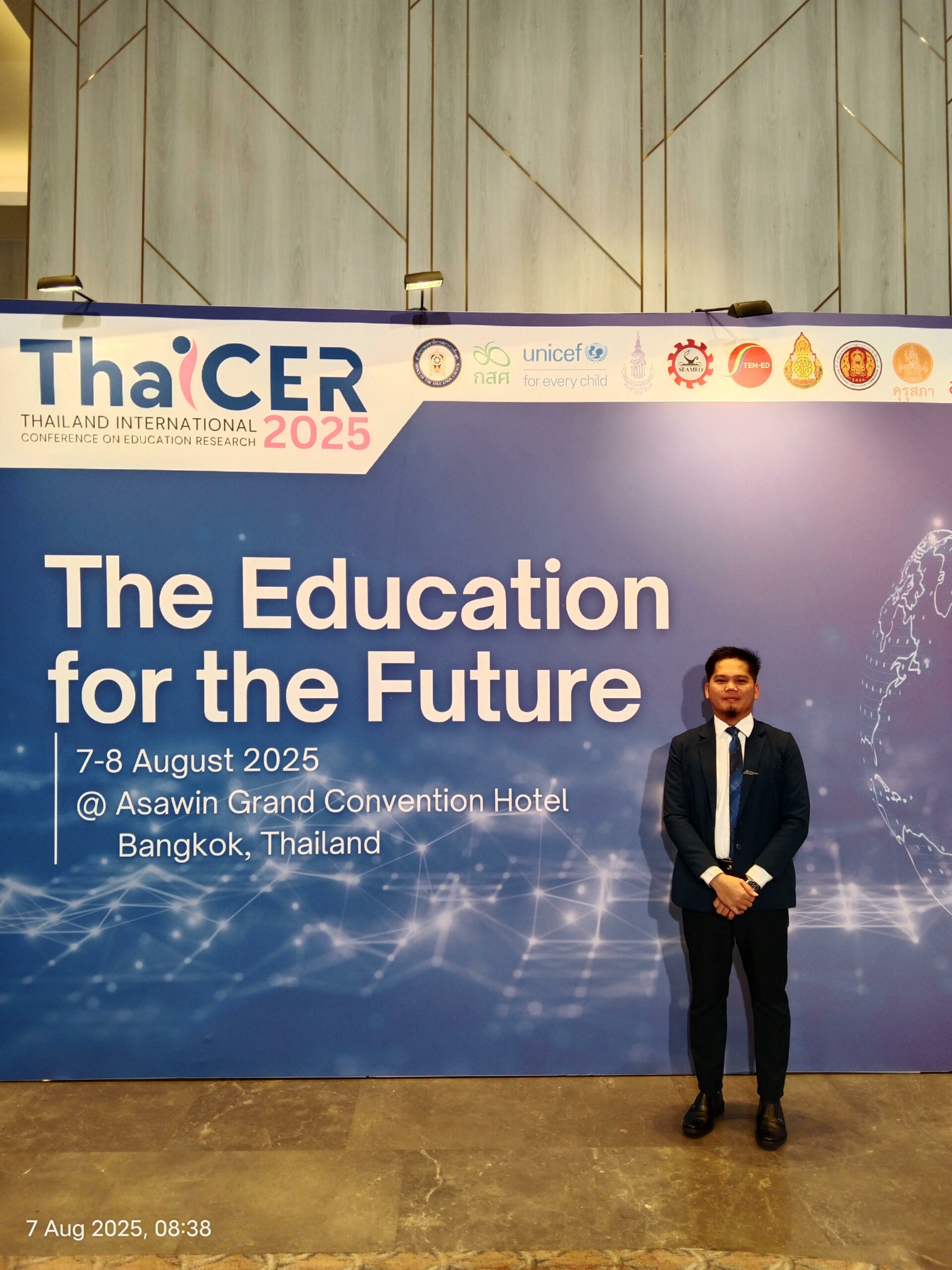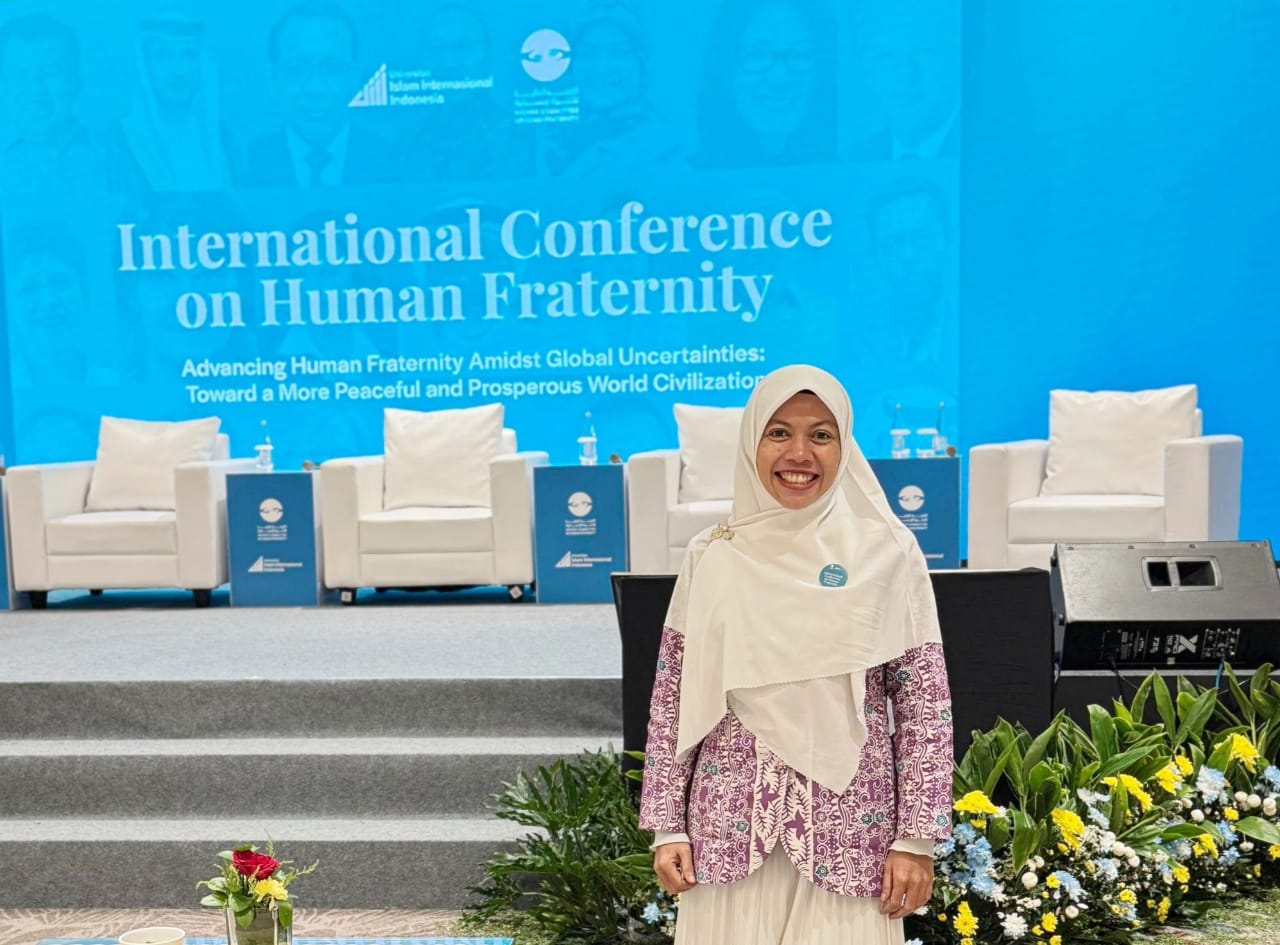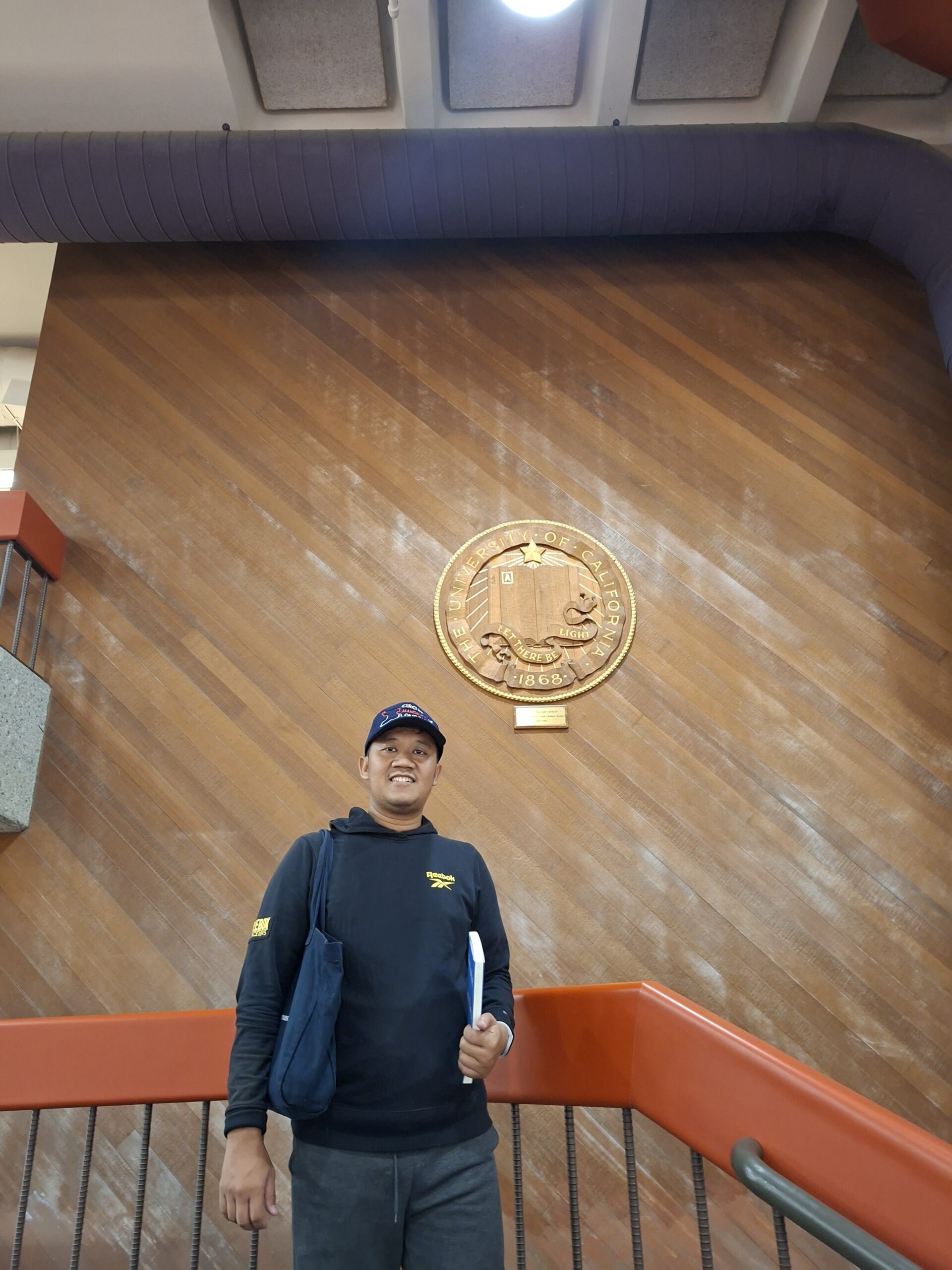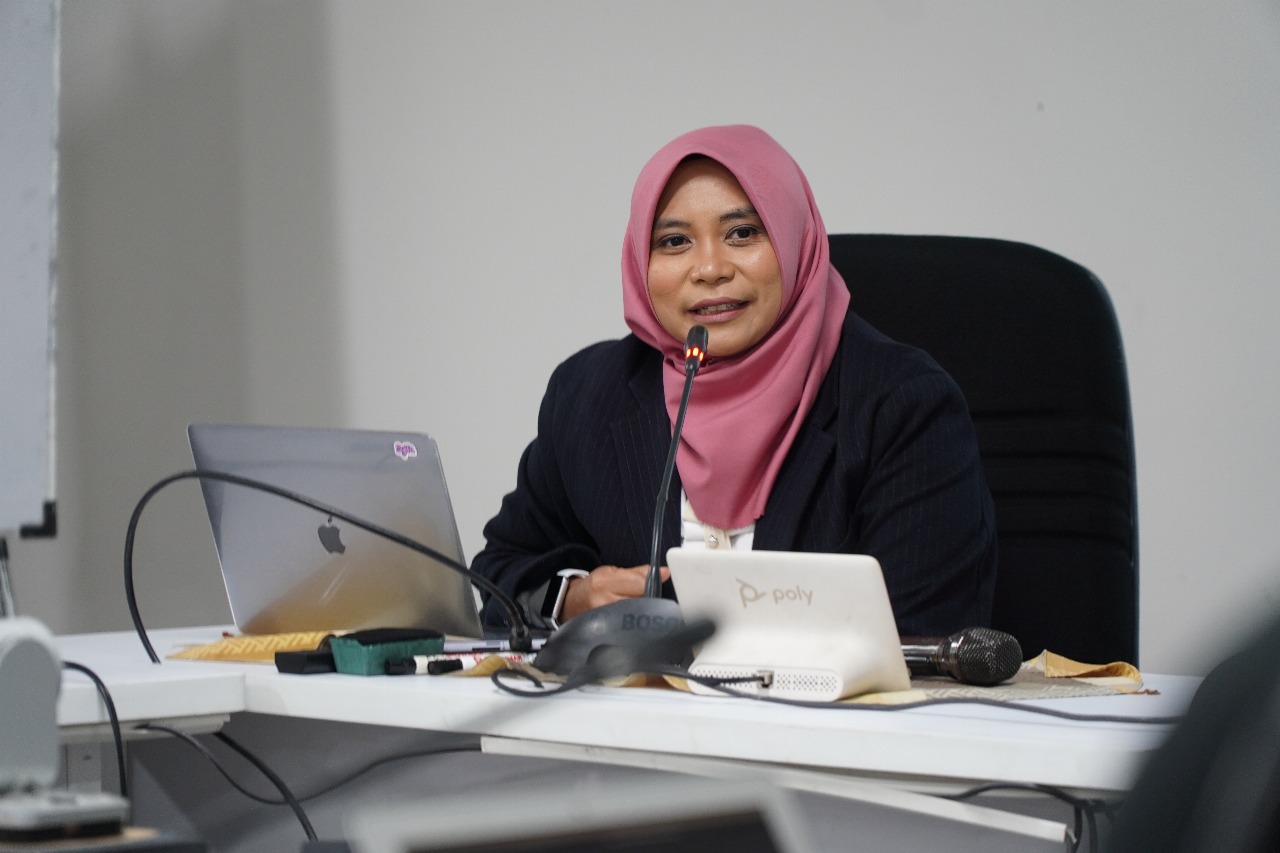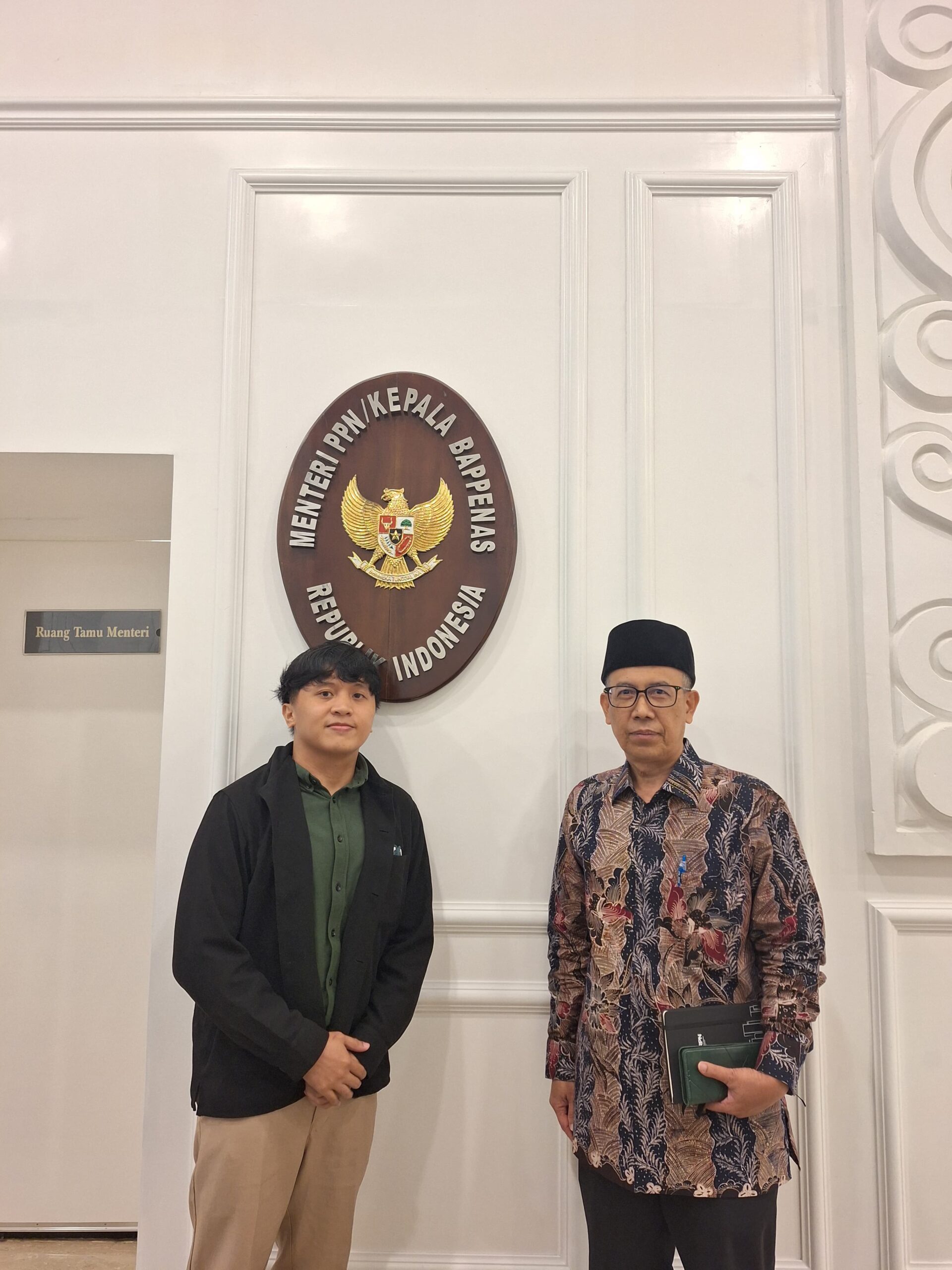The Process Was Not Easy, but I Did It: A Thesis Writing Journey as an Outsider

The Process Was Not Easy, but I Did It: A Thesis Writing Journey as an Outsider
By Queen Salsabila
Writing a thesis is a final requirement for us, the last year students of Universitas Islam International Indonesia (UIII), to obtain our Master of Arts in Education degree. Writing it was not an easy task; we put our effort, spirit, and dedication into it. We all had our own struggles to finish it, and for me, doing it as an outsider made the journey even more challenging yet memorable. My thesis discusses the role of empathy as the mediator between the effect of collective teachers’ efficacy and school climate on the well-being of English teachers in the special region of Jakarta. As someone who was born, raised, and finished a bachelor’s degree in East Java, I had no personal connection with my field research site or its people when I began my research.
Some people may wonder why I did not make it easier by going to my hometown and doing the research there. However, after considering everything, particularly the uniqueness and diversity of culture in Jakarta, which will add special value for my research topic, I chose Jakarta as my research site. Thus, with that belief and support from my supervisors, I took the big risk of choosing Jakarta as my research site and put East Java as my second plan. This journey was full of self-doubt, fear, tears, and overthinking, but I kept going, believed that I would face it, and in the end, it was all worth it.
Along the way on this journey, despite all my doubts, I always believed that I could do it. At the first step, as an outsider, I had to build everything from scratch. In detail, because my research is quantitative, it requires a lot of participants. Thus, I began my journey by looking for any teacher who could help me become a research assistant. This process was not smooth, because my research participants are English teachers in Jakarta, I began by checking the Instagram account of the English Language Teachers Association (MGMP), but I could not find any active account. I continued my journey by asking some friends who became English teachers, through this way, I got one of the contacts of an English teacher, who is fortunately one of the treasures of MGMP in Pasar Minggu sub-district in South Jakarta. I went to her school to meet her and explain my research topic, and she agreed to be my research assistant.
Furthermore, to obtain legal permission, I went to the Jakarta Provincial Education Office to submit a research permit letter and request a research recommendation letter to conduct research in Jakarta. Eventough Jakarta is a province, buat actually it is a big metropolitan city, which also Indonesian capital. This process was going smoothly, and they were willing to help me in the process of data collection. Through this, my belief that I can complete this research has increased. However, this feeling did not last long. In the data collection process, it was hard for me to gain the data, even though I had already received help from my research assistant and the educational office to distribute my instrument. Realising that waiting would not help, I found another way. I am seeking help from a more impactful person in the field, who is the head of MGMP in DKI Jakarta, both in Junior and Senior High School. I met them to explain my research, my struggle, and to ask for help. During that meeting, I also got the contact number of the head of the School Principals’ work forum (MKKS), so I contacted and met him. Consequently, my data increased gradually.

Despite that, after weeks of waiting, I have not yet reached my target, while the submission deadline for finishing my research is approaching. A feeling of fear came over me, but I am not stopping here, I try another way. With the help of my best friend, Kak Nabila, I dedicated myself to taking a more direct approach. I visited several schools in person, and we went door to door around schools in Jakarta near Depok, waiting for hours to meet the teacher coordinator or principal. In this journey, I accepted both the warm welcome as well as some rejections. Continuing that, I did follow-ups every three days with the heads of the association, even joining their event to introduce myself, explain my research in the forum, and ask for their help to participate. I also contacted a hundred teachers. And finally, I meet my appropriate number of participants. This process taught me patience, humility, and empathy. I learned to respect every rejection and value the slow progress that builds my resilience.
More than that, the challenge is not stopping; the data analysis process is challenging, as is the data collection process. I made mistakes in my analysis, which led to repeating the analysis process. Here, I strive to continuously learn from my mistakes, which leads me to a deeper understanding about the research process and its analysis. From this journey, I believe that if there is a will, there will be a way. For someone who will follow my step, it will not be easy, but you should remember to be courageous, be persistent, never be tired of trying and learning, keep going even if it is a small step, and remember to believe that you can do it, while also having plan B. In the end, this journey not only shaped my research skills but also my character. It gave me valuable lessons that research could never teach. Lastly, thank you so much to everyone who helped me and supported me during this process, especially my supervisor, Assoc. Prof. Charyna Ayu Rizkyanti, PhD, who have always believed in me and guided me during this process. The Journey was not easy, but I made it.
Interweaving Activism and Academics: Reflections on my Educational Journey with UIII
 Interweaving Activism and Academics: Reflections on my Educational Journey with UIII
Interweaving Activism and Academics: Reflections on my Educational Journey with UIII
By Ajeng Satiti Ayuningtyas
For me, education has always been more than just classrooms and textbooks. It is the breath of life, a path to justice, and a bridge that connects us with those who are often marginalized. From the beginning, I have been involved in various educational movements, not because I feel capable, but because small, consistent changes can foster great hope.
My journey of activism has taken me to various communities. In 2015, I built Sekoci Foundation (Yayasan Sekolah Cinta Anak Indonesia), formerly known as Sekolah Kolong Cikini, located in the Gondangdia RPTRA (under the train station) as an alternative learning space for marginalized children. I also noticed that the opportunity to receive a good education was only available to children who were already well-off, so what about marginalized children?
Sekoci was born out of my concern for marginalized children in Central Jakarta who struggled to access formal education. Together with my colleagues, we created an alternative learning space that was friendly, creative, and full of love. We call it "Sekoci"—a nod to the philosophy of a small ship shining a light in the darkness and navigating the ocean of knowledge. At Sekoci, there are four classes with different age ranges. These include A1, which is like preschool for ages 3-5; A2 for ages 5-7; B1 for elementary school; and B2 for junior high and high school. We currently have 80 students studying with us. Our programs include Mendarat (Storytelling and Relaxed Learning), Berlayar (Let's Learn and Go Together), and Dermaga (Sitting with Leaders and Parents).
 Through Sekoci which 10 years established, I learned that education isn't just about the curriculum but also about taking sides. The children we mentor not only learn to read and write but also importantly discover the meaning of togetherness, self-confidence, and dreams. From this experience, I have come to understand that every child has the right to dream big, regardless of their background. I remember writing a paper in my Education and Society class titled "Left Behind the System: Exploring the Role of Alternative Education for Central Jakarta's Marginalized Children," which I planned to present online at the Asian Conference on Education (ACE 2025). For me, it was essential not only to understand the theory but also to apply what I had learned in practice.
Through Sekoci which 10 years established, I learned that education isn't just about the curriculum but also about taking sides. The children we mentor not only learn to read and write but also importantly discover the meaning of togetherness, self-confidence, and dreams. From this experience, I have come to understand that every child has the right to dream big, regardless of their background. I remember writing a paper in my Education and Society class titled "Left Behind the System: Exploring the Role of Alternative Education for Central Jakarta's Marginalized Children," which I planned to present online at the Asian Conference on Education (ACE 2025). For me, it was essential not only to understand the theory but also to apply what I had learned in practice.
Another effort that I'm also actively involved in a read-aloud community, which may sound simple, but it has incredible power in fostering children's interest in reading. Through Barikade (Reading from Close Family), I've helped drive reading campaigns in public spaces, homes, and schools. From this activity, I've learned that literacy isn't just merely about reading skills but also about building emotional bonds between children, parents, and the community. Reading together is a way to foster closeness, curiosity, and critical awareness from an early age. Taking Literacy and Development Resources classes has further enriched my understanding of the world of literacy, which I can share with the community.
 As a student mom of two, I'm currently involved as a facilitator in Sadar Ibu (Mother Awareness Program). Sadar Ibu is a program that optimizes the role of women through group support and mental health education. We know that women, especially mothers, play multiple roles in their daily lives. This program opens new perspectives and serves as a comfortable space for mothers to share their stories and receive support through mental health education from professionals, clinical psychologist. The Psychology in Education, Human Development, and Well-being in Education courses have further sharpened my role in Sadar Ibu, empowering mothers to be open of the help and support. There are still many mothers who need help with their mental health. I wrote a paper on Educational Leadership Management to see explore female leader and her wellbeing titled Coping Strategies of a Female Principal in Maintaining Wellbeing for School Effectiveness: A Case Study at PKBM in Pamulang.
As a student mom of two, I'm currently involved as a facilitator in Sadar Ibu (Mother Awareness Program). Sadar Ibu is a program that optimizes the role of women through group support and mental health education. We know that women, especially mothers, play multiple roles in their daily lives. This program opens new perspectives and serves as a comfortable space for mothers to share their stories and receive support through mental health education from professionals, clinical psychologist. The Psychology in Education, Human Development, and Well-being in Education courses have further sharpened my role in Sadar Ibu, empowering mothers to be open of the help and support. There are still many mothers who need help with their mental health. I wrote a paper on Educational Leadership Management to see explore female leader and her wellbeing titled Coping Strategies of a Female Principal in Maintaining Wellbeing for School Effectiveness: A Case Study at PKBM in Pamulang.
From Field Activist to Scholar-Activist
Upon joining the Faculty of Education at UIII in a master of arts program, I found a space that combined academic reflection with practical experience. Class discussions, theoretical readings, and cross-cultural interactions allowed me to re-examine my journey through a new lens.
In the Leading Educational Change course, I understood that educational movements, such as Sekoci, do not operate in isolation. Educational movements like Sekoci are part of a broader change effort that requires strategic implementation within a defined policy framework. Then, I was a principal of kindergarten school before and as a leader in the education movement, the educational leadership and management class also helped me gain a macro perspective. Leadership in education does not always emerge from structural positions but also from community initiatives.
Through Education and Society, I realized the close relationship between family, society, and the state in shaping the educational ecosystem. What I experienced at Barikade or Sadar Ibu (Mother's Awareness) turned out to be a concrete practice of critical educational theory.
UIII has been helping me reconcile my two identities: field activist and academic. I learned that experiences in the community need to be written, analyzed, and published to become shared knowledge. This way, they can inspire more people and even influence policy.
I no longer view activism and study as two separate paths but rather as one, mutually reinforcing one another. Activism gave me real-world experience; the speakers provided me with a framework for understanding and expanding its impact.
Studying at UIII gave me a new energy: that I am not just a volunteer, facilitator, or community founder, but also a scholar-activist ready to bring ideas from the field to the academic realm, while simultaneously returning theory to practice.
The education I champion can favours children, empowers families, strengthens women, and protects the earth. And it is at this intersection of activism education finds its true meaning. Because education is a collective work, so we have to hand in hand work together and collaborate in this long-term journey.

Social Capital in Action: Lesson from Gernas Tastaka and Gernas Tastaba

Social Capital in Action: Lesson from Gernas Tastaka and Gernas Tastaba
By Dona Kuswoyo
In a simple room, a group of education activists gathered for their monthly routine meeting. One by one, members (i.e. teachers) presented ideas, attentively listened to by the others, followed by discussions that sometimes led to heated debates. This atmosphere has persisted for more than seven years like a rhythm that confirms their nature as a community of practice: a group of people who regularly interact to deepen knowledge and practices in the fields they care about. I am part of one such community, namely Gernas, a national movement focused on improving the quality of basic education, particularly literacy and mathematics. Through Gernas Tastaka (National Movement for the Eradication of Mathematical Illiteracy) and Gernas Tastaba (National Movement for the Eradication of Reading Illiteracy), which I have been involved as a volunteer for the past four years.
My initial involvement to this movement began during the pandemic (2020), when a friend asked for help in developing the Gernas Tastaka program for parents. At that time, many parents were unprepared to assist their children with learning at home. From there, I gradually became "entangled" in a solid and purposeful volunteer network. What united us? A concern as well as a belief: that Indonesia's basic education needs more attention, and grassroots initiatives can make a tangible impact. Gernas is not just an ordinary volunteer gathering. Here, volunteers from diverse backgrounds. From teachers, lecturers, trainers, designers, writers, even former CEOs on private sector, joined Gernas to contribute according to their expertise. As for myself, which have background in teacher training, I teach literacy and mathematics based on modules developed by the team.

The dynamics of this community taught me a lot. I learned from the "provocateurs" who were not afraid to debate with strong arguments. As an observer who later became actively involved, I absorbed knowledge from these quality discussions. Uniquely, although its members are spread across various regions with a master trainer located in Jakarta and local trainers in the regions, this community remains solid without having to work together day by day. This flexibility also suits my health condition, which prevents me from working full-time.
Ultimately, Gernas is a kind of evidence that communities of practice can be a platform for learning, collaboration, and real action. With a spirit of volunteerism and a commitment to quality education, we continue to move, often without formal scrutiny, to make a direct impact on the ground.
What Gernas Have Done So Far
Since its founding on November 10, 2018, Gernas, under the Penggerak Indonesia Cerdas (Empowering an Enlightened Indonesia) Foundation, has not only focused on training elementary school teachers in mathematics and literacy but also developed various engaging supporting programs. For example, the “Bincang Gernas” or Gernas Talks are held online at the end of each month. This kind of talk show actually discuss basic concepts of elementary school mathematics and literacy, share good practices from teachers across Indonesia, and hear the opinions of practitioners and academics.
My experience visiting a district in Sumatra with Gernas opened my eyes to a bitter reality: the math skills of the majority of teachers there are still in the procedural stage. They likely memorize the steps to solve problems. There was no reasoning behind those procedures. Nevertheless, these teachers aware of their weakness and what was truly inspiring was their extraordinary enthusiasm for learning. Despite their limitations, these teachers displayed an enthusiasm I rarely see in big cities. They were willing to leave the training late, even though that mean they had to navigate dark, unlit streets after sunset, just to keep learning together in the training location. In fact, the Gernas team often had to end training sessions early for their safety, even though the teachers' enthusiasm was still burning.
Gernas also established the Penggerak Indonesia Cerdas Research Center (PRPIC), which collects various educational research. It was at PRPIC that I learned many new things, from research methodology, learning and education theories, to a bit of statistics that of course in the beginning gave me a headache! In 2024, shortly before I was accepted as a master student at UIII, I shared the results of our research on elementary school teachers' mathematics competencies in the UIII theatre room. So, it's possible that one or two lecturers from the UIII Faculty of Education already recognise me which made me even more nervous during the entrance exam interview.

Equally transformative was my involvement with BAJIK (short for Barisan Pengkajian Pendidikan), a dedicated forum for discussing contemporary educational issues. The scope of our dialogues was remarkably broad, mirroring the discussion on Education and Society course. Through BAJIK, I understood the complexity of Indonesian education. One conversation that remains vividly with me explored the world of alternative education. It is a concept entirely outside the conventional school system. This perspective was a profound revelation, gifted to us through the insights of Mbak Anyi, one of the Gernas member, and her extensive network. The experience has ignited a keen desire within me to share these discoveries about alternative learning pathways with my colleagues at UIII's Faculty of Education probably through Estudia.
After more than four years of engagement with Gernas, I realize that this movement has been an invaluable growth platform. As a community of practice, Gernas not only honed my technical competency in teacher training and research, but also shaped my critical thinking through substantive discussions within BAJIK. My direct experience in few districts in Sumatra, witnessing how teachers with limited resources possessed an inspiring passion for learning, further strengthened my belief: real change begins with the commitment of caring individuals.
Upon my reflection, Gernas demonstrates that its success lies in something intangible, usually called as a social capital. As James Coleman (1997) points out, social capital in the form of networks, trust, and collective norms within a community can be a more powerful driver of change than mere funds or facilities. Gernas to my knowledge proves this. Through the dedication of volunteers, the trust built with educators across regions, and a spirit of mutual collaboration, Gernas has managed to deliver training, research, and policy dialogue that reach even the most remote communities. It is the commitment of volunteers that is the backbone of this movement, demonstrating that when people come together around a shared vision, non-material resources can be a transformative force.
Now, as a member of the UIII academic community, I would like to invite lecturers and students to experience the organic learning experience of Gernas. Here, the educational theories we study in class can find practical application. For those interested in research, PRPIC offers a real-life laboratory for examining the challenges of primary education. For those who want to contribute directly, our teacher training program provides opportunities for real impact. We can make Gernas as a bridge between academics and practitioners, because truly, the greatest social capital for advancing Indonesian education already exists among us: collaboration.
Where Empathy Meets Scholarship: Reflections from attending European Early Childhood Education Association (EECERA) conference
 Where Empathy Meets Scholarship: Reflections from attending European Early Childhood Education Association (EECERA) conference
Where Empathy Meets Scholarship: Reflections from attending European Early Childhood Education Association (EECERA) conference
By Syifa Mufiedatussalam
Attending the EECERA Conference in Bratislava, Slovakia, on 25-28 August 2025, was an unforgettable experience for me personally. I felt so proud to be part of a conference series that has been running for 43 years. The EECERA is widely recognized as one of the most reputable in the field of early childhood education in the world. And being held in Europe made it even more meaningful. The continent where early childhood education first took root, since Froebel to Montessori. So, it felt like returning to the source, learning directly from its origins.
I loved the atmosphere. At EECREA, the participants were not only brilliant scholars with remarkable contributions but also supportive, humble, and full of empathy. The vibes were incredibly positive. Everyone valued and respected each other, and I felt genuinely welcomed. From the very first sessions to the last conversations in the hallways, there was a sense of warmth, respect, and empathy. These were not just academics presenting data or theories. At EECERA, the participants were the people who genuinely cared about children’s futures.
Together with my supervisor, Assoc. Prof. Charyna Ayu Rizkyanti, PhD, I had the chance to discuss with the president of EECERA and the chief editor of the Early Childhood Education Research Journal (EECERJ). We chatted over coffee, shared stories, and learned more about how EECERA is expanding its reach across the globe. To our surprise, we were even invited to take on the role of EECERA Country Coordinators for Indonesia. It was an honor as well as a responsibility that we are eager to embrace.
I was also privileged to present two papers alongside my supervisor:
- Striking the Right Balance of Cognitive and Affective Empathy in Gen Z Early Childhood Teachers
- How Well Are You, Dear Early Childhood Teachers?

Sharing these papers in such a supportive environment was transformative. It was about bringing Indonesian voices to the international stage. We are also contributing to the ongoing global dialogue on early childhood education and teacher well-being. The feedback was thoughtful. At the same time, the discussions felt like genuine collaborations rather than critiques. We found a safe space to talk. All the ideas were not only tested but also nurtured. I left each session not with a sense of being judged. I felt appreciated. Because my study resonated with others who care deeply about the same issues.
Presenting my papers at EECERA was not only about sharing research findings. It was also about representing our country, Indonesia, at the international stage. I felt a deep sense of responsibility to bring the story of my country into the conversation. Indonesia is not just another context. It is a vast and complex nation. I reminded the audience that Indonesia is the world’s largest archipelago, with more than 17,000 islands located in Southeast Asia region. It is home to hundreds of ethnic groups, with over 800 living languages spoken across the country. This incredible diversity shapes not only daily life but also the way education is envisioned and practiced.
As I introduced my research, I shared how educational policies in Indonesia are designed to navigate this complexity. Many participants were surprised to learn about the scale of our nation, and about the challenges of implementing policies across such a geographically dispersed and culturally diverse population. For some of them, it was the first time they realized just how big Indonesia is, and how different our educational landscape looks compared to most countries in Europe. While many European countries deal with relatively more uniform systems, Indonesia must find ways to create unity while honoring diversity. This makes policymaking especially challenging, and fascinating.
This context provided the foundation for discussing the well-being of early childhood education (ECE) teachers in Indonesia. I explained that teacher well-being cannot be separated from the broader educational system and the cultural environment in which they work. When policies must address thousands of schools and communities spread across islands, the pressure on teachers often multiplies. Many teachers must balance not only professional expectations but also community roles and family responsibilities. By telling Indonesia’s story, I not only shared research data but also gave a human face to the challenges and aspirations of our teachers. In return, I received understanding, solidarity, and the reassurance that in EECERA, we are not alone.
In our discussions after the presentation, colleagues from different countries reflected on these challenges with empathy. We shared stories about how burnout has become a common issue among ECE teachers, regardless of country or system. Yet, the Indonesian context added another layer to this global issue. It made visible how systemic complexity can amplify stress for teachers. The recognition that burnout is not just an individual problem but a structural and cultural one sparked rich conversation with fellow scholars.
Together, we came to a shared understanding: improving teacher well-being is a collective responsibility. It is not something a single teacher, institution, or even a single country can tackle alone. Within EECERA, we all have a part to play in fostering empathy and care for the people who dedicate their lives to nurturing young children. Teacher well-being is not a luxury; it is a necessity if we want quality education for all.
What made EECERA truly unforgettable was the spirit of community. I found myself surrounded by scholars who were open in their hearts. These moments reminded me that conferences are as much about people as they are about papers. The friendships and networks formed here will stay with me, shaping not only my research trajectory but also my professional identity. This reminds me about empathy. The value we bring to this professional community. EECERA is a community where empathy meets scholarship. A community that truly cares about children, teachers, and the future of education. I am honored to have been a part of it. It was more than just a conference. It was a space to learn, to share, and to feel the warmth of a community.
Beyond a Profession Education Lives as a Discipline of Knowledge and Social Change
 Beyond a Profession Education Lives as a Discipline of Knowledge and Social Change
Beyond a Profession Education Lives as a Discipline of Knowledge and Social Change
Insof Waeji
As a student who studied in Indonesia for seven years, from bachelor's to master's level, I feel this is an extraordinary award. I am truly grateful to Allah SWT for being given the opportunity to gain knowledge in the land of the Republic of Indonesia, especially to be part of the Indonesian International Islamic University (UIII). This campus is relatively new, and I was fortunate to be part of the third batch at the Faculty of Education. Despite its young age, UIII offers progressive learning innovations as well as a rigorous and focused education system.
For me, continuing my studies in the field of education is a dream I have been dreaming of for a long time. Education here is not only understood as limited to printing teachers of subjects. More than that, I found that educational science covers various important aspects on a large scale from policy, literacy, well-being, assessment, evaluation, technology, leadership, equity, society, to educational philosophy. People often ask me, "Then what kind of teacher will you be after you graduated? English teacher, right?" That question sometimes makes me smile, because the answer is not that simple. The knowledge of education that I learned is not only about teaching in the classroom, but also about the contribution that can be made to the education sector in general, even touching the realm of political and economic policy. Explaining it is sometimes quite complicated, but that is exactly where the wealth of this discipline lies.
Education at UIII is also the main field for me to try to become a researcher, participating in conferences, and get involved in various projects that contribute to the field of education. Through this experience, I had the opportunity to interact and learn directly from academics, researchers, and inspiring lecturers, who are not only enriched my vision but also shaped my critical thinking and professionalism. In addition, the various tasks given by lecturers are varied, ranging from individual work to group projects, from academic essays to scientific articles. All of that has indirectly sharpened my writing skills and analytical skills. The process requires patience, creativity, and the ability to work together, so I feel that this academic journey shapes my character and way of thinking.
More than that, the experience of learning in class is enjoyable and challenging. Each subject is like a piece of a puzzle that slowly merges into a big picture of the world of education. Class discussions teach us to think critically, especially because the friends come from various countries with diverse experiences and educational contexts. As a student from Southern Thailand a region with a complex, unique political system that has direct implications for education, I learned a lot to compare best practices from other countries while reflecting on the challenges in my home country. Looking back on this seven-year journey, I realize that my time in RI and at UIII has been more than just obtaining knowledge, it has been process of growth, self-discovery, and building a vision for the kind of contribution I hope to make in the education field. As I move forward, I carry with me the invaluable experiences of collaboration, research, and intercultural engagement that have shaped me into the educator I aspire to become.
It’s Now or Never: Overcoming Self-Doubt
 It’s Now or Never: Overcoming Self-Doubt
It’s Now or Never: Overcoming Self-Doubt
By Rakim Legawan Sammy
Standing Side by Side: Rediscovering Humanity through the Lens of Human Fraternity

Standing Side by Side: Rediscovering Humanity through the Lens of Human Fraternity
Uswatun Hasanah
PhD Student in Education batch 3
Tuesday, 29th July 2025, marked a historic moment for Indonesia, as it witnessed the official launch of the International Institute for Human Fraternity (IIHF) through a two-day international conference themed “Advancing Human Fraternity Amidst Global Uncertainties: Toward a More Peaceful and Prosperous World Civilization.” The event was initiated by the Higher Committee of Human Fraternity (HCHF), in collaboration with Universitas Islam Internasional Indonesia (UIII). This momentum represented a concrete follow-up to the Document on Human Fraternity, signed in Abu Dhabi in 2019 by Pope Francis and Grand Imam of Al-Azhar, Sheikh Ahmed el-Tayeb. The document laid the foundation for promoting peace, mutual understanding, and coexistence across global communities.
The opening ceremony was led by three prominent figures: Prof. Jamhari, Rector of UIII; Dr. Khalid Al-Ghaith, Secretary General of the Higher Committee of Human Fraternity; and Dr. Pratikno, Coordinating Minister for Human Development and Cultural Affairs of Indonesia. Their presence highlighted the importance of this initiative in advancing global peace, interfaith dialogue, and the values of human fraternity. The establishment of the IIHF signifies Indonesia’s growing leadership in fostering inclusive cooperation and ethical responsibility at the international level.
The event continued with a series of thoughtful and emotionally resonant sessions addressing urgent humanitarian issues across the globe. Participants from diverse backgrounds (professions, religions, communities, races, and countries) immersed themselves in the event with a shared goal and a united vision: to take meaningful action in supporting displaced individuals, stateless people, and marginalized communities, so they can live their lives with dignity, recognition, and purpose.
This sense of unity became especially clear during Session 1, titled “Building Fraternity Across Borders: Migration, Poverty Alleviation, and Refugee Solidarity,” when the discussion turned to the global refugee crisis. The session seemed to bring everyone together, as if we were all in the same boat, driven by a shared desire to contribute through our own roles and efforts as a real expression of human fraternity.
This idea was reinforced by one of the speakers, Dr. Valeria Martano, Consultor of the Pontifical Council for Interreligious Dialogue, who offered a powerful reflection on the language we use when engaging with difference. She challenged the use of the word tolerance, explaining that it can imply a sense of superiority, as if one group is in the position to 'tolerate' another. Instead, she proposed the terms coexistence and mutual respect, which suggest equality and shared dignity. Her insight reminded me that true human fraternity is not about enduring each other’s presence, but about walking alongside one another with humility and genuine respect. It’s not about who gives space to whom, but how we share that space.
 During this event, I had a conversation with Simon from the Eden community, whose existence I had not been aware of before. It made me realize that just because something is unseen doesn't mean it doesn't exist. And if it does exist, whether it's a voice, a struggle, or an identity, it deserves to be recognized with equal rights, equal opportunities, and shared responsibilities.
During this event, I had a conversation with Simon from the Eden community, whose existence I had not been aware of before. It made me realize that just because something is unseen doesn't mean it doesn't exist. And if it does exist, whether it's a voice, a struggle, or an identity, it deserves to be recognized with equal rights, equal opportunities, and shared responsibilities.
In the third session on the first day, during the discussion on The Media's Role in Bridging Divides, Combating Misinformation, and Promoting Human Fraternity, Simon shared that his community often faces discrimination and even persecution as a result of misleading information circulated on social media. I felt a deep sense of empathy when he shared that reality. It made me realize that while the Human Fraternity program addresses global issues on a broad scale, its values should be applied in our immediate surroundings. This experience reminded me that we don’t always have to look far to practice human fraternity; it starts with the smallest actions and the people closest to us.
The values of accepting diversity and living side by side with others have been deeply instilled at UIII. One of the courses offered at the Faculty of Education is Education in a Pluralistic Society, taught by the Dean, Prof. Nina Nurmila. In this course, she invited guest speakers from minority groups such as the Bahá’í, Shi’a, and Ahmadi communities. Being exposed to their stories and presence made me realize something deeply significant that they are human beings, just like me. When I shook their hands, I felt their skin touching mine , and it felt no different. When they shared joyful stories, their eyes lit up, and I smiled with them. But when they shared painful memories of being discriminated against and persecuted, it tore my heart. In those moments, I stopped seeing differences in labels and started seeing shared humanity.
At the heart of this entire experience, I came to understand a deeper dimension of solidarity. It is important to hold on to our identity, our faith, our culture, our background, but sometimes, the most profound act of fraternity is being willing to set it aside, to stand side by side with those who remain unrecognized by the systems around them. Setting aside our identity, in this sense, becomes an act of compassion and solidarity. It is not a loss, but a gift, an intentional step back to allow others to step forward. As the saying goes, "Nothing can be gained without losing; even heaven demands death." If letting go of our identity allows our brothers and sisters to reclaim theirs, then the gain is far greater. And that, to me, is what human fraternity truly means.
Three Keys to Win A Travel Grant to the USA Conference
Three Keys to Win A Travel Grant to the USA Conference
By Muhammat Sabar Prihatin (Phd student at the Faculty of Education UIII 2023)
 Being accepted as a presenter in six different international conferences in Indonesia and abroad marks a significant ambition of my second-year study journey here in the faculty of education UIII. From November 2024 to June 2025, I already presented my papers in several conferences, such as the third International Conference on Religious Moderation (ICROM) held by the Ministry of Religious Affairs of Indonesia in Jakarta, 5-7 November 2024, where our lecturer Dr. Andar was one of the keynote speakers in this event. I also had a chance to present my paper online in the International Conference on Research, Community Service, and Gender Studies (ICRCSGS) conducted by UIN Imam Bonjol Padang, West Sumatera, 5-6 December 2024. Prof. Nina, our dean, was one of the keynote speakers. Not to mention, on 10-11 May 2025, I presented my paper in the third International Conference on Islamic Education and Science Development (ICONSIDE) held by UIN Mataram, Lombok, West Nusa Tenggara. The head of the PhD in Education program, Dr. Bambang, was one of the keynote speakers in this forum. Lately, I have flown all the way from Jakarta to Los Angeles to present my work in the Society for the Anthropology of Religion (SAR) Biennial Conference conducted by the American Anthropological Association, taking place in the University of California, Santa Barbara (UCSB), California, USA, 21-23 June 2025.
Being accepted as a presenter in six different international conferences in Indonesia and abroad marks a significant ambition of my second-year study journey here in the faculty of education UIII. From November 2024 to June 2025, I already presented my papers in several conferences, such as the third International Conference on Religious Moderation (ICROM) held by the Ministry of Religious Affairs of Indonesia in Jakarta, 5-7 November 2024, where our lecturer Dr. Andar was one of the keynote speakers in this event. I also had a chance to present my paper online in the International Conference on Research, Community Service, and Gender Studies (ICRCSGS) conducted by UIN Imam Bonjol Padang, West Sumatera, 5-6 December 2024. Prof. Nina, our dean, was one of the keynote speakers. Not to mention, on 10-11 May 2025, I presented my paper in the third International Conference on Islamic Education and Science Development (ICONSIDE) held by UIN Mataram, Lombok, West Nusa Tenggara. The head of the PhD in Education program, Dr. Bambang, was one of the keynote speakers in this forum. Lately, I have flown all the way from Jakarta to Los Angeles to present my work in the Society for the Anthropology of Religion (SAR) Biennial Conference conducted by the American Anthropological Association, taking place in the University of California, Santa Barbara (UCSB), California, USA, 21-23 June 2025.
Those experiences reflect my endeavours to engage in national and global academic conversations as an emerging scholar. This story would have never happened unless because of various valuable lessons I learned, particularly from our beloved university. I figured out three keys that I believe had enabled me successfully to participate in such meaningful academic events I mentioned before, including winning a competitive travel grant for the U.S. conference. Let me share my reflection on this story in more detail, as follows.
Themed Religiosities, Ecologies, and Environmentalisms in the Age of the Anthropocene, the SAR conference was attended by hundreds of presenters, such as university students, lecturers, and professional researchers, coming from world top institutions and universities, such as Harvard, Stanford, Oxford, Michigan, Toronto, Cambridge, Edinburg, SOAS, Melbourne, Sydney, Beijing, Taiwan, and many more. In that conference, I was the one and only presenter coming from Indonesian university, which is our beloved UIII. I shared my comparative findings about the roles of two prominent Indonesian Islamic mass organizations, NU and Muhammadiyah, in their stewardship towards environmental obstacles in Indonesia based on Wasatiyah principles. Actually, there was another Indonesian presenter, my colleague who is currently a PhD student in the faculty of Humanities and Social Sciences at UCSB. He is the one who shared the information about this conference with me. Thanks to a friendship that turned into networking.
Thank God, in addition to being accepted as presenter, I also won a travel grant that is awarded to only five grantees in the SAR conference. I was so happy to be one of them. To apply for this grant, we are required to submit an accepted abstract, statement letter explaining why we fit the requirements, and latest CV. This grant was very beneficial to facilitate my U.S. Visa application as well as to financially support my departure to the USA.
The SAR conference, for me, is one of the most prestigious and essential academic forums I have ever joined. It presented expert scholars who shared their academic works that positively have direct impacts on wider society, including in the environment where the study was conducted. Additionally, their findings offer adaptable policies and recommend concrete actions that can be adopted by governments and the stakeholders, leveraging benefits of the research itself. Overall, their presentation really amazed me in the sense of the way they did their study, and this is what I mean by essential, that academic conferences become an inspiring platform to exchange knowledge and shape understanding through thoughtful and meaningful research for the goods of human beings as well as the environment.
Should I leave a message to encourage colleagues, as emerging scholars, to take part in such academic forums, I have three things to say. First I would say public events matter. Let us join in public lectures, such as seminars, conferences, book discussions, etc., that we think can enrich our knowledge and broaden perspectives even if the topic falls apart from the field of our study. Such programs often help unexpectedly connect our study field with other branches of disciplines. This combined-areas meeting can be crucial to discover distinct sights in conducting research as well as a key factor for collaborative study. The SAR conference topic is actually not really my study area since it is more on religion, society, and environment, while my major is education. However, I remember the fifth ClimateTalk on Muslims Environmentalism held by FOSS and a public lecture on Faith & Environment: Pragmaticism, Piety, and Ethics held by our university inspired me to write the paper.
Secondly I suggest that anything can be studied scientifically. Let us take benefits from classes, courses, or programs, such as writing clinics in our library, that offer us opportunities to learn research methodology, whether qualitative, quantitative, or mixed-methods. For me, research skills, such as collecting and analysing data, constructing conclusions or reflections, and knowing proper tools are keys that enable us to conduct a scientific study properly. Surely it is great if we can apply more than one method in doing research. But, truly mastering one approach only is already sufficient to study any human activities, events, or phenomena academically. So, instead of doing complex research such as field work for my paper in the SAR conference, I chose the most doable method for me by doing a comparative content-analysis study. I can do this because I have learned several research methodology courses previously.
Last but not least, thanks to the existing various communities in our university. I believe such Islamic Global Challenges (IGC) initiative under the faculty of Islamic Studies in our university is crucial for all civitas academia, including students and lecturers from any department. Such programs can serve as a platform for collaboration and contribution to increase our concerns toward global issues through research or real actions. Thus, our university should optimize their roles/functions so that the beneficiaries will also get more maximum. I strongly believe that the potential of IGC I mentioned in the SAR Travel Grant proposal form at that time became one of the most powerful reasons why I won the award.
Empathy and Well-being: Values That Inspired Me as a Student Mom
 Empathy and Well-being: Values That Inspired Me as a Student Mom
Empathy and Well-being: Values That Inspired Me as a Student Mom
By Syifa Mufiedatussalam
Pursuing my Ph.D. at the Faculty of Education, I began my journey as a “healing” of my daily routine as an 8 to 5 worker. At that time, I thought this was my opportunity to gather with new friends from various countries, expand my knowledge, and of course, earn another degree.
This journey, however, was not without its challenges.
I never thought that the journey would be like a rollercoaster. My life, which was far from academic activities, turned into a life full of papers, reading, and writing. Moreover, I experienced my first semester during the pregnancy, together with overwhelming academic activities. Then I gave birth and raised a baby, who is now entering toddlerhood. I experienced all of this alongside my commitments as a PhD student and a working mom.
Through the initiation of the Faculty of Education, under the Dean Prof. Nina Nurmila, Ph.D, the university established a daycare. At that time, it was exactly 3 weeks after I delivered my baby. I felt how the faculty, in their very empathetic way, tried to fully support us. The faculty gently encouraged me to focus on my study, reassuring me that my child was in good hands. However, it doesn't mean that my journey then became smooth without obstacles. I experienced baby blues syndrome because my child was hospitalized almost every two months at that time. Meanwhile, at the same time, I had to submit my course papers and presentations. Moreover, I am aware of the limitations of my academic writing skills where I have to learn from scratch to catch up with my Ph.D. fellows. Nevertheless, I am very fortunate that until now, daycare has become a very important support system for me.
Beyond facilities, what truly makes me survives was the community. Alhamdulillah, I was blessed with a new family here. The faculty members were always ready to share their knowledge generously. When I knocked on their doors with questions, I was welcomed with patience and thoughtful responses. Their sincerity made learning feel like a shared journey. At the beginning of my Ph.D., I was particularly concerned about how the dissertation phase would unfold. I was worried that, as we each progressed into our individual research projects, we would become isolated—detached from our peers and overwhelmed by the demands of our dissertations. However, as the journey progressed, I realized that I was not alone. My supervisors accompanied me patiently through every stage of the research process, providing not only academic guidance but also emotional encouragement. I was also surrounded by fellow Ph.D. students from Batch I—people who became more than peers. We shared struggles, victories, and quiet encouragements. We lifted each other up, laughed through stress, and held on to hope together. That sense of brotherhood and sisterhood was priceless.
More importantly, the faculty demonstrated a deep awareness of this concern by establishing a structured system of bi-monthly Dissertation Progress Meetings. These meetings served as a vital space to monitor progress, however small, and to maintain a sense of momentum. They were not merely administrative check-ins; they became opportunities to receive constructive feedback, strategic recommendations, and positive reinforcement to help us overcome research challenges. These meetings gradually turned into our “Ph.D. Batch I family gatherings”—a moment of truth where we shared stories, laughter, struggles, and strengthened the bonds of friendship. In those spaces, we reminded one another that we were never alone on this journey. What changed the most was me.
In the course on education and pluralistic society, A/Prof. Charyna Ayu Rizkyanti, Ph.D introduced us to empathy. I never expected that we would learn about empathy in the Faculty of Education. However, since that moment, I started to fall in love with empathy. I reflected that, it turns out, the value of empathy aligns with the religious moderation promoted by the university. Since then, the direction of my dissertation research shifted to empathy and well-being, which of course is supervised by her. Empathy and well-being—concepts taught not only as theories but modeled in practice—became values I deeply internalized. Not just as my research topics, but as ways of living. I witnessed how empathy creates space for understanding, healing, and personal transformation. I saw how these values allowed us to grow together—as individuals, as scholars, and as a community.
UIII taught me to see knowledge as a form of worship. Research became not just a task, but an amanah. I learned to align my intention with service—to my community, my faith, and the broader world. That shift turned every paper, every reading, every sleepless night into something meaningful. When I first joined UIII, I felt like an empty glass. Having been away from formal academic settings for several years, I entered the program with humility and awareness of my limitations. But through rich discussions, rigorous coursework, and the guidance of dedicated lecturers, I began to grow. And while I continue to discover how much I do not yet know; I now feel that my 'glass' has grown—perhaps into a bucket—ready to be filled even more. I am being filled not only with knowledge, but also with deeper questions, broader insights, and the confidence to contribute with purpose.
With this perspective, I have begun to give back. I provided private consultancy to a friend who was developing an Islamic elementary school (SDIT). I have also had the opportunity to support teachers in pesantren communities—sharing what I have learned while continuing to learn from them. These contributions are not mine alone; they are the fruit of the relationships, inspiration, and knowledge I gained during my time at UIII.
As I near the end of this journey, I carry a prayer in my heart: that all of us in this first cohort will graduate together, on time, with hearts full of gratitude and knowledge that blesses others. I hope we will continue to support each other, to share, and to grow beyond this academic journey.
To my fellow students and those who will come after us: come with humility. Empty your glass. Make room for what this place offers. You will be amazed at how much you grow—together with this institution, hand in hand with its vision.
And to UIII: may you always be a home for those seeking not only knowledge but also purpose. Thank you for supporting me in becoming who I am today. This journey shaped my mind and touched my soul. I will always carry it in my heart with gratitude and humility.
Education and Society - Study Visit to Bappenas
 Education and Society - Study Visit to Bappenas
Education and Society - Study Visit to Bappenas
by Ihsan-Isah Imam Zaman
On Tuesday June 17, 2025, the Batch 4 MA students of the Faculty of Education at Universitas Islam Internasional Indonesia (UIII) have successfully conducted their study visit to the Ministry of National Development Planning, also known as Badan Perencanaan Pembangunan Nasional (BAPPENAS). This wonderful opportunity is largely thanks to the strong collaboration between BAPPENAS and UIII in their efforts to improve the quality of higher education and research in Indonesia. This study visit is part of the learning experience of the students that will help them gain an improved understanding of the course Education and Society.
As a Muslim-Filipino who has been fortunate enough to be part of the Faculty of Education in UIII, I am very grateful to have been part of this learning experience. Personally, I have not even been to the equivalent government agency of BAPPENAS in the Philippines. That is why I could not help but try to maximize the experience as much as possible. As an aspiring researcher interested in policymaking, education and research in national level, this study visit has been quite rewarding and beneficial.
The study visit has reminded me of when I was applying to UIII as a postgraduate student. When I was writing my motivation letter, I was trying to bare my passion and dedication to the common good through my writing. Somehow, I find myself consistent in my belief that education has really powerful impact in turning the life of an individual or community for good. Without a single doubt in my mind, I strongly believe in the power, importance and value of teachers and educators in improving the condition of society and empowering individuals.
From my personal encounters in my country, I have seen firsthand how expensive it is to be poor, especially in education. I have observed how some marginalized people seem to have been forgotten by the vast majority. Despite the existing government policies, there seems to be no improvement at all. I used to wonder if it is simply a phenomenon of social apathy or some communities are just bound to experience social exclusion. These reflections may not fully represent what truly drives me to pursue higher studies, but one thing I have realized is that I need to learn more— because passion and intention alone cannot bring about tangible change.
In the faculty of education, it is mandatory for the MA students to take the course Education and Society. In this course, we are learning about the relationship between education and other disciplines that contribute to social development and shape social progress. We learn how politics, culture, society and religion influence education and also how education affects them in return. To be honest, this course has truly helped me develop a more structured way of thinking about the factors that affect education. Prior to starting my postgraduate study, the way I think was often either too one-dimensional or too scattered. Somehow, I knew that there were various factors at play but my grasp of them was still immature.
 Talking more about the study visit, we first went to the gallery of BAPPENAS. Inside the gallery, we have been captivated by the simple but meaningful displays that help us visualize the past, present and future endeavors of BAPPENAS. During that brief tour, we have been introduced to the key events and figures of the ministry. The artistic representation of their works is all interesting but what caught my attention the most was the section about Blue Economy. This concept is relatively new for me and even in the Philippines this is still in emerging stage.
Talking more about the study visit, we first went to the gallery of BAPPENAS. Inside the gallery, we have been captivated by the simple but meaningful displays that help us visualize the past, present and future endeavors of BAPPENAS. During that brief tour, we have been introduced to the key events and figures of the ministry. The artistic representation of their works is all interesting but what caught my attention the most was the section about Blue Economy. This concept is relatively new for me and even in the Philippines this is still in emerging stage.
Why did I get hooked on the Blue Economy when I should be focusing on issues and trends in Education? I guess it is because, in some way, this concept speaks to my identity. First of all, I am from a tribe whose name is derived from a term that means ‘The people of the lake’. Then growing up, I keep hearing the stories about my grandparents being fishers. My father used to help my grandfather fish for a living, which helped support his and his siblings’ education. People do not choose the circumstances or reality that they will be born into, but the social contract demands that those who take on political power have a responsibility to craft and implement policies that support people from all walks and conditions of life. In this regard, education plays a crucial and irreplaceable role.
Afterwards, we also had a brief but comprehensive lecture from BAPPENAS about the process of education policymaking, which involved not only rich theoretical discussions but also practical insights. There were a lot of topics covered and my batchmates raised interesting questions that were appreciated by the experts for their critical relevance. I would like to highlight the topic about out of school children because it is quite an important issue in education especially when we talk about the idea of no child left behind or better yet, no one left behind. In our first semester, I used to talk about juvenile delinquency and out of school youth which I previously struggle to find similar topic about in Indonesian context. Thanks to this session, I found out that similar topics are being studied by some of my batchmates and it also align with the current efforts of BAPPENAS. From my perspective, the impact of social exclusion can be felt from as early as childhood. This is why there are more researchers highlighting the importance of early childhood education.

Our batch is truly grateful for the iniative of the Faculty of Education and our lecturer in this course, Dr. Amich Alhumami, Ph.D, who also serves as the Deputy Minister for Human Development and Cultural affairs. Placing this session near the end of the course and semester has helped us connect theoretical insights with practical experience. I have come to understand more clearly that the broader the scope of the research, the more it needs not only a high level of expertise, but also empathy and a strong sense of humanity. The greater the scope, the more people are involved, and the more lives affected by its outcomes.

